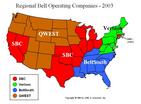 While sitting in a small room perusing a book from the bottom of the stack, The Dilbert Future, I idly looked again at Scott Adam’s prediction #2:
While sitting in a small room perusing a book from the bottom of the stack, The Dilbert Future, I idly looked again at Scott Adam’s prediction #2:
In the future, all barriers to entry will go away and companies will be forced to form what I call “confusopolies”.OK, good snark. But look at the list of industries he identified as already being confusopolies:Confusopoly: A group of companies with similar products who intentionally confuse customers instead of competing on price.
- Telephone service.
- Insurance.
- Mortgage loans.
- Banking.
- Financial servvces.
And the other four are the source of the currrent economic meltdown, precisely because they sold products that customers couldn’t understand. Worse, they didn’t even understand them!
It gets better. What industry does he predict will become a confusopoly next? Electricity! And this was in 1998, before Enron engineered confusing California into an electricity-price budget crisis.
For risk management, perhaps it’s worth considering that simply selling something the customer can understand can rank way up there. Certainly for the customer’s risk. And given how much the FIRE companies drank their own Kool-Aid, apparently it’s good risk management for the company itself. Especially given that the Internet now gives the customer more capability to find out what’s going on behind a confusopoly and more ability to vote with their feet.
To actually make a product the customer wants, and then provide good customer service: how old-fashioned! And how less risky and more profitable in the long term.


